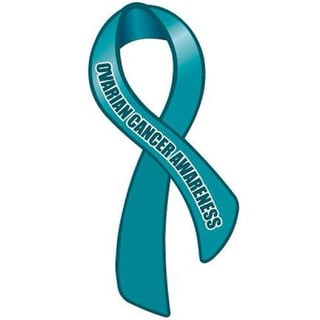
September is Ovarian Cancer Awareness Month. Each year in the U.S., more than 22,000 women are diagnosed and more than 14,000 women die of ovarian cancer. Ovarian cancer is particularly deadly because it can be very difficult to detect in early stages. 92% of patients who are diagnosed and treated before the cancer is able to spread outside the ovaries survive at least five years after diagnosis, but only about 15% of cancers are found at this stage. For patients whose cancer has spread to surrounding tissues or nearby lymph nodes before it's found, then the 5-year survival rate is 73%. The further the cancer can spread before it’s found, the more difficult successful treatment becomes.[1]
Are screening tests available for ovarian cancer?
Unfortunately, there is no screening test for ovarian cancer that is currently recommended by any major medical or professional organization. Both transvaginal ultrasound and the CA-125 blood tests have been tried as screening methodologies, but studies have found that while these types of screening often lead to additional testing and sometimes surgeries, they do not reduce mortality from ovarian cancer.[2]
Because early detection is a tremendous advantage when fighting any type of cancer, the search for an effective screening test continues. An Oxford University team recently discovered that women with ovarian cancer, as well as those genetically predisposed to it, have higher levels of a protein called SOX2 in their fallopian tubes. According to team member Ahmed Ashour Ahmed, “A test for SOX2 could not only help detect cancers early but in some cases would enable us to detect a tumor before it becomes cancerous.” Currently, there is no accepted method for detecting SOX2 in the fallopian tubes, however, so further research will be needed before this type of screening may become available.[3]
What are the symptoms of ovarian cancer?
Besides the lack of effective screening, the relative lack of identifiable symptoms also makes ovarian cancer difficult to catch at early stages. Symptoms that have been linked to ovarian cancer are fairly common and often attributable to other causes. However, if you begin to regularly experience these symptoms, they continue for more than a few weeks, and you can't attribute them to a more common condition, the American Cancer Society recommends promptly consulting your gynecologist[4]:
- Abdominal bloating, swelling, or pain
- Pelvic pressure
- Difficulty eating or feeling full quickly
- Increased urinary urgency or frequency
How is ovarian cancer diagnosed?
You doctor will first perform a physical exam to look for signs such as an enlarged ovary or abdominal fluid. If, following the physical exam, your doctor believes there is reason to suspect ovarian cancer, she will order further tests. These commonly include imaging and, if imaging tests reveal a mass, biopsy.
Transvaginal ultrasound is often used to examine the condition of the ovaries, look for tumors, and, if a tumor is present, gain insight into its composition. CT scanning is also sometimes used, but as CT doesn’t show small tumors as well, it is more useful for gaining information about the extent of cancer than for diagnosis.
A biopsy is the only way to tell for sure whether a mass is cancer. Most often, biopsy is done on ovarian tumors by removing them, although other methods are sometimes used when surgery is counterindicated.[5]
At Iowa Radiology, we know that information is important when you have concerns about your health, and we strive to be an information resource for the Greater Des Moines community. If you ever have any questions about a procedure at one of our clinics, don’t hesitate to ask. We’ll always take the time to tell you all we can.
Feel free to download one of our free eBooks, full of information about procedures we regularly perform here at Iowa Radiology.
The information contained in the Iowa Radiology website is presented as public service information only. It is not intended to be nor is it a substitute for professional medical advice.You should always seek the advice of your physician or other qualified healthcare provider if you think you may have a medical problem before starting any new treatment, or if you have any questions regarding your medical condition.
[1] "Ovarian Cancer: Statistics." Cancer.net. American Society of Clinical Oncology, April 2015. Web. 19 Aug 2016.
[2] "Can Ovarian Cancer Be Found Early?" Cancer.org. American Cancer Society, 4 Feb 2016. Web. 19 Aug 2016.
[3] Knapton. "Ovarian cancer test on horizon as scientists find earliest signs of disease." The Telegraph. Telegraph Media Group Ltd., 28 July 2016. Web. 19 Aug 2016.
[4] "Can Ovarian Cancer Be Found Early?" Cancer.org. American Cancer Society, 4 Feb 2016. Web. 19 Aug 2016.
[5] "How Is Ovarian Cancer Diagnosed?" Cancer.org. American Cancer Society, 4 Feb 2016. Web. 19 Aug 2016.




